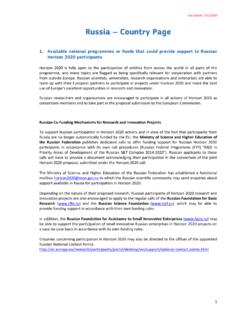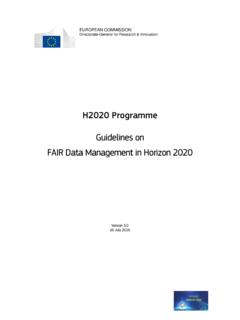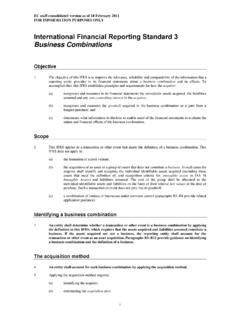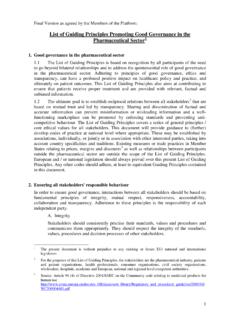Transcription of Deliverable 2 Principles of good governance in sport
1 08 Fall S e p t e m b e r 2 0 1 3 EU Work Plan for sport 2011- 2014 Expert Group good governance Deliverable 2 Principles of good governance in sport XG GG Deliverable 2: Principles of good governance in sport 2 INTRODUCTION At the third meeting of the Expert Group on good governance (XG GG), held on 6 June 2012, the members and observers of the Group discussed the issue of good governance Principles in sport on the basis of a document presenting national rules and codes existing in the EU Member States. Participants agreed that some overarching Principles of good governance can be identified across the board, but that it is important to maintain flexibility and to have a pragmatic approach, with a view to taking into account the vast differences existing in sporting structures and to focus on recommendations that can bring an added value at EU level.
2 A discussion document was subsequently prepared and discussed by the Group's members and observers at the XG GG meeting on 13 December 2012. The document presented an initial list of recommendations concerning good governance Principles that should guide the action of sports organisations of different sizes and nature across the EU. The following list of good governance Principles is based on the document presented at that meeting and it incorporates changes and amendments proposed by members and observers during the discussion. At the meeting in December 2012, the Group agreed to postpone the adoption of Deliverable 2 until mid-2013, in order to take into account the results of the projects in the field of good governance financed through the 2011 Preparatory Actions in the field of sport .
3 Results from these projects do indeed usefully complement the list of recommendations by providing evidence-based facts and data and by identifying examples of good practices in this field. Input from the projects has been included as an annex to the list of good governance Principles . BACKGROUND/CONTEXT sport has evolved dramatically in the last 20 years. At the elite level there has been a transformation in the commercialisation of sport . Major sporting events attract millions of viewers, hundreds of thousands of spectators and generate significant revenues. Sponsorship and merchandising activity has also grown exponentially. Media interest in sport has risen to new highs and the recent emergence of social media networks means sport is now subject to a greater and swifter level of scrutiny and public interest than ever before.
4 Elite sporting competition, lifestyle adjustments and other initiatives have helped to fuel interest in grassroots participation in sports in Europe. An increasing number of people want to be involved in sport at all levels and in different capacities. This has led to more interest and intervention from national governments in sporting matters and the activities of sports bodies including verification of whether sports bodies are fit for public funding. Globalisation, increased cross border activity, the need to comply with international federations' regulations and operating within an uncertain legal framework have all challenged the sports movement in Europe. In particular, the need to comply with an evolving and increasingly complex body of national and EU laws has made the development and implementation of sports regulatory policy more challenging.
5 XG GG Deliverable 2: Principles of good governance in sport 3 There is now a greater interest (and expectation) across the stakeholders of sport to participate in the future direction and policy making activities of sports governing bodies (hereinafter: sporting bodies) and to have their views heard and appropriately reflected in the decisions of those bodies. In this context members/participants are acting more like consumers and becoming more demanding. Shifting demographics and societal changes within Europe and beyond require sporting bodies to consider whether existing inclusivity policies, diversity strategies and levels of representation across all groups remain appropriate and reflective of their participants and society in general. A particular issue in this regard is the access of women to leadership positions in sports organisations within the context of the wider debate on gender in Europe and at international level.
6 As public interest in sport has increased and the financial stakes have risen there has been a growth in the propensity of participants at all levels to pursue legal claims requiring sports bodies to adopt effective risk management practices and insurance protocols to minimise legal and financial exposure. The integrity of sport has been subject to significant challenge over recent years, inter alia given the growth of sports betting. Match-fixing, corruption and other criminal activities have arisen in different sports in various territories across Europe and beyond. Such activities have highlighted the vulnerability of sport to match fixing and other corrupt practices. Sporting bodies are no longer able to deal with the threat and challenges to sporting integrity alone. The assistance of regulators, national governments and law enforcement agencies with their additional powers and investigative authority is needed by sports bodies to allow them to tackle the threat of match fixing and other corrupt activities, as well as appropriately structured relationships with betting operators on areas such as bet types.
7 Increasingly, sports bodies must seek to form partnerships, engage in dialogue and co-operate with governments, European institutions and other state agencies in a range of areas and such public authorities may be more inclined to link public funding to minimum standards of good governance , particularly in relation to financial subsidies and the deployment of public money by sports bodies. The autonomy of sports bodies is now more susceptible than ever before. Interventions from the courts, national governments or regulators, commercial interests or European institutions are more likely. Indeed, in its 2011 Communication Developing the European Dimension in sport the European Commission developed its position beyond that of previous comments confirming good governance is a condition for the autonomy and self-regulation of sports organisations.
8 Owing to the positive values sport embodies, sporting bodies in many EU Member States and at EU level receive significant public funding. In relation to the use of such funds the application of good governance Principles can play an important role. In short, sports bodies that do not have in place good governance procedures and practices can expect their autonomy and self-regulatory practices to be curtailed. In identifying good practice in the context of good governance for sports bodies it is important to be pragmatic, flexible and proportionate. Many different sports bodies have considered issues of good governance in their own unique context. However, this initial set of recommendations seeks to outline top level Principles covering the whole sport movement (as opposed to only major governing bodies or event owners), address professional and amateur sport , embrace team sports and individual disciplines, assist large and small sports bodies and not deter volunteers from taking part in sport .
9 XG GG Deliverable 2: Principles of good governance in sport 4 In general, it is possible to identify three main categories of sports organisations which can be defined as recipients of the recommendations outlined hereafter: 1. The first category includes grassroots sport organisations. Grassroots sport covers all sport disciplines practiced by non-professionals; individuals who spend most of their time practising sport or who earn most of their income through sport are therefore excluded from this category. Grassroots sport bodies have specific characteristics that need to be taken into account when addressing the issue of good governance , namely their reliance on volunteers (in cooperation with limited paid staff) and their focus on participation. 2. The second category includes national sports governing bodies and national umbrella sports organisations.
10 These are the bodies responsible for the organisation of sport throughout all the layers of a single discipline (from grassroots to the elite) at national level. They are in charge of setting and enforcing rules within a given territory and to oversee that those rules are applied consistently under their jurisdiction. They are part of European (continental) and international federations. 3. The third category includes European and international federations. These bodies have a special role to play in the field of sport . International federations usually set the rules of the game and are in charge of organising major international tournaments. European federations organise continental competitions and are responsible for the organisation of sport within their area.



















